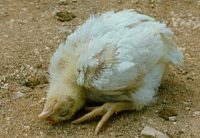Indian Prof develops Newcastle disease vaccine

Poultry farmers in the India will now have a new vaccine to keep away Newcastle disease, one of the most serious diseases affecting birds bred for commercial purposes.
An associate professor in the department of veterinary microbiology in Madras Veterinary College has been able to produce a live Newcastle disease vaccine through the incorporation of a new strain of the virus after a 10-year study.
“There are regular outbreaks of the Newcastle disease in poultry farms. It is not a seasonal disease and can affect birds of any age, so in case of an outbreak an entire flock of birds can die within 48 hours, leading to production loss,” said Dr J John Kirubaharan.
He began his work on developing the virus in 1992 when he was a research scholar in the Tamil Nadu Veterinary and Animal Sciences University.
“The mortality rate of the affected birds is 90%, and most commercially bred birds cannot withstand the onslaught of the disease.
“Village chickens that manage to survive the virus attack have low productivity, yielding comparatively fewer eggs, and with thin shells,” he added.
Oral pellet
Guided by Dr K S Palaniswami, the former director of research at the college, Dr Kirubaharan extracted the TANUVAS D58 strain of the Newcastle disease virus from an unvaccinated village chicken.
In 1999, The Indian Council for Agricultural Disease offered funding to develop an oral pellet vaccine for the disease.
Ten years on, the oral pellet vaccine is ready, while the virus has been bought by for Rs 10 lakh (app. €15,000) by Globion ,a private player, for large scale commercial production of the drop vaccine.
“Though the disease doesn’t spread to humans or other animals, caretakers of the affected birds have been known to be affected by conjunctivitis.
“This vaccine will certainly be a boon to poultry farmers. The oral pellet vaccine does not require the caretaker to handle the birds to give the vaccine as is required in the others which have to be instilled into the eyes and nostrils of the bird.
“The oral pellet can just be mixed with the feed and given to the birds,” says Dr V Ramaswamy, professor and head of the department.
Thermostability
“The Newcastle disease is the oldest and most serious of diseases affecting poultry. And while there are other vaccines for the disease this one has distinct advantages over the others because of its lower virulence and as it has been thermostabilised,” says TANUVAS vice-chancellor Dr P Thangaraju.
“Thermostability allows flexibility in refrigeration temperature. The low pathogenocity of the virus strain proved by biological tests and genome characterization ensures that the birds do not fall ill after being given the virus.













